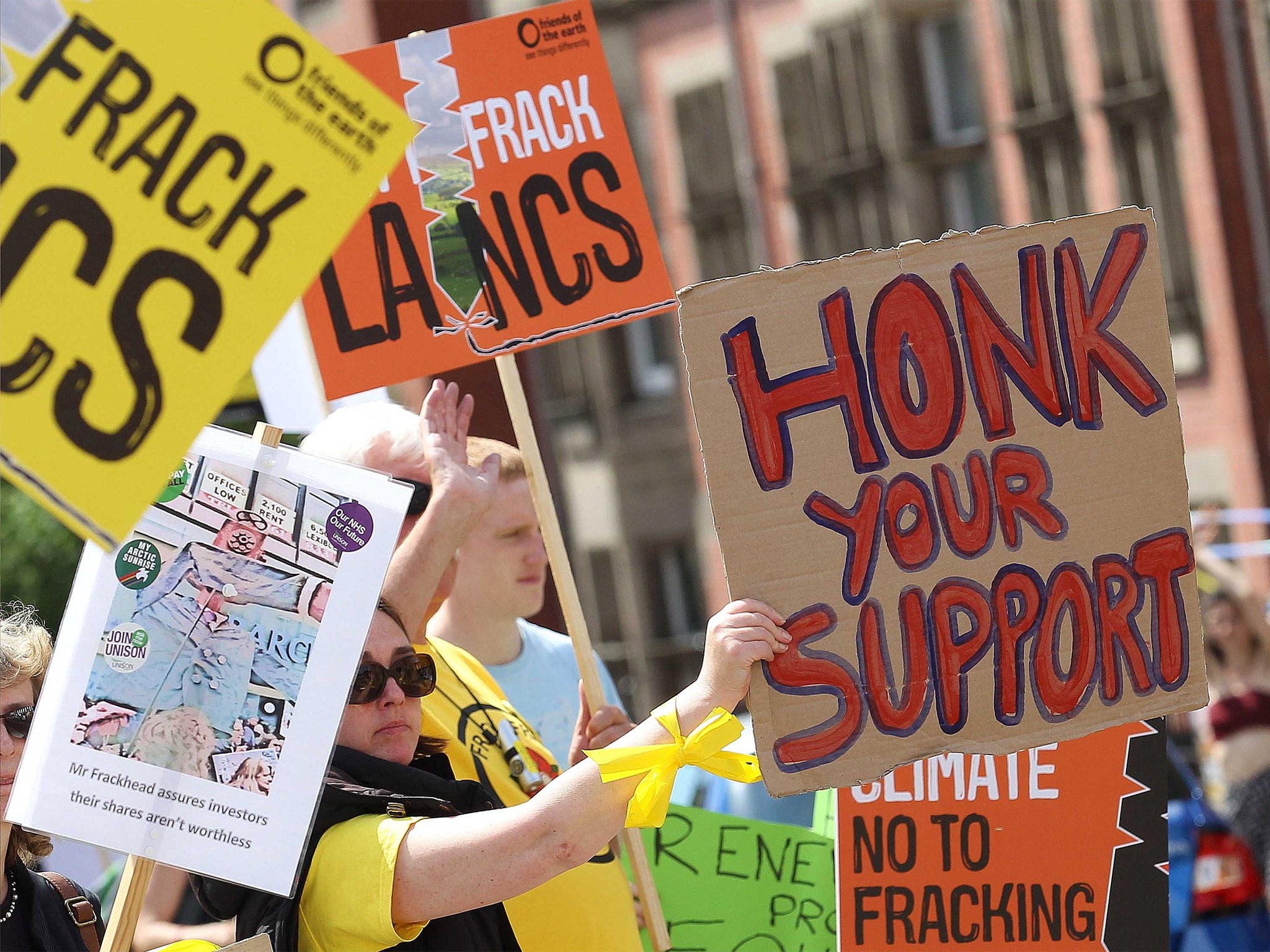Fracking: Decision on Lancashire shale gas site postponed amid an extraordinary legal row
Councillors said their decision had been constrained by 'secret' legal advice

A decision on whether or not to approve the UK’s first fracking site has been postponed amid an extraordinary legal row.
Lancashire councillors complained that their deliberations had been constrained by “secret” legal advice which they had been provided with – in private – only hours before the planned vote.
Councillor Paul Hayhurst felt so strongly that he proposed a motion to make the advice public so people could see how they were being influenced. The motion was passed and the legal advice could be published today. The vote on the site, at Little Plumpton, near Preston, was postponed until Monday.
The scenes in Preston County Hall will raise fears that councillors are being pushed to back fracking plans – or risk exposing the council to expensive legal action from Cuadrilla, the firm behind the shale gas proposal. Cllr Hayhurst said: “The fact is that members of the committee have been given legal advice that has tied their hands and it has been a waste of time us being here the last few days. I think the legal advice must be shown to the public.”
His complaint came after another councillor, Marcus Johnstone, said that the planning decision had put council members “under intolerable pressure”.
Speaking outside the meeting, Green Party leader Natalie Bennett said: “If you listen to the strain in the councillors’ voices here, it’s obvious they feel the huge amount of pressure they’re under. They’re being told if you make a decision against Cuadrilla it could be really expensive.”
The councillors would not disclose the detail of the legal advice or any concerns they had about it, ahead of its official publication. However, one legal expert who heard the proceedings told The Independent he believes the concerns relate to advice they were given about which grounds could – and couldn’t – be used for objecting to the proposal.
Friends of the Earth legal adviser Jake White said it appeared that the councillors’ legal adviser whittled down the possible grounds for refusing from the five options proposed by one of the councillors – to just one.
“One of the councillors proposed that there were five possible grounds on which the application could be turned down and that was challenged by one of the other councillors,” he said. “They went into a meeting with their legal adviser and… a motion was put to turn down the application on just one ground. So presumably the legal advice had been ‘You can’t really turn it down on the other four, you can really only turn it down on this one’.”
The grounds apparently removed by the legal adviser include concerns about noise pollution, and the impact on residential amenities.
The outcome of the vote will have huge implications for the future of the shale gas industry in the UK. A decision to allow fracking to go ahead would give a huge boost to the prospects for a fracking revolution as it demonstrates local councils are willing to approve planning applications despite widespread local opposition and concerns about earth tremors and air and water pollution.
But a vote against would demonstrate the depth of opposition to the technology and the willingness of local councils to make their decisions independently of central government wishes.
Francis Egan, the boss of Cuadrilla, said if the application was approved, he was hopeful that conventional test drilling could begin on the site by the end of the year and that fracking tests could start by the middle of 2016.
What next for fracking in the UK?
Q | What happened?
A | Wednesday was meant to seal the fate of Cuadrilla’s planning application for the UK’s first potential fracking site. But, instead, the crucial meeting of Lancashire county councillors to vote on the proposal raised more questions than it answered – adding an extra layer of complexity to what is a notoriously drawn-out process at the best of times. To begin with, the vote, was delayed several times before finally being postponed until Monday – and possibly later. This is because of concerns that the councillors may be nudged into waving through this highly controversial project by their legal advisors.
Q | What happens now?
A | Between now and Monday, the private legal advice will be published, allowing the public to see whether councillors’ concerns have any foundation. If Cuadrilla is granted planning permission it is still unlikely that full-scale commercial production would happen before 2020.
Q | What exactly do Cuadrilla want to do?
A | The group want to begin conventional test drilling to assess the make-up of the rock by the end of the year. Test fracking – to determine how much gas could be fracked by testing how well it flows out of the ground – could then begin by the middle of next year. But this testing and analysis stage is likely to take several years. In the broader industry, the government is assessing nearly 100 bids for shale gas licences covering a vast area of the country and is planning to announce the winners by the end of the year.
Subscribe to Independent Premium to bookmark this article
Want to bookmark your favourite articles and stories to read or reference later? Start your Independent Premium subscription today.

Join our commenting forum
Join thought-provoking conversations, follow other Independent readers and see their replies